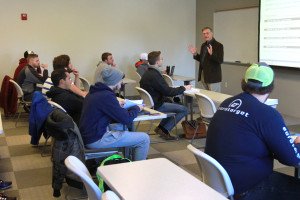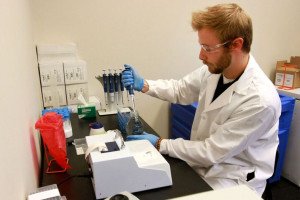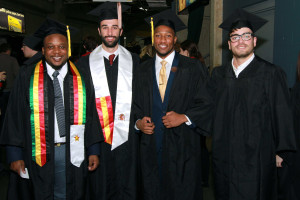As students, you are no doubt aware that faculty have specific expectations for your learning. To confirm that learning, faculty carry out certain assessments. So what should you know about this assessment of student learning? First, recognize that assessment occurs in different settings and at different times as illustrated below.

In the Classroom
Student performance on assignments aligned with learning outcomes; End-of-course evaluations surveys; and Nationally-normed surveys on student engagement and higher-order learning.

Outside the Classroom
Participation in experiences like internships and research; Student retention and graduation rates at the institution; and Nationally-normed surveys on student satisfaction with services, housing, student life, etc.

After Graduation
Full-time employment; Enrollment in graduate or professional school; and Alumni feedback on their experience and learning at Lindenwood
Frequently Asked Questions
In Simple Terms, What Exactly is Assessment?
Think of assessment as involving three basic steps:
- Faculty develop learning goals – that is, they establish expectations for your learning. For example, in each academic program (e.g., psychology), faculty establish Program Learning Outcomes (PLOs) - expectations for what faculty expect students to learn by the time they complete the program and Course Learning Outcomes (CLOs) - expectations for what faculty expect students to learn by the time they complete a given course.
- Faculty assess whether the expected learning has occurred. How do they conduct this assessment? By any number of means – for example, through final exams in key courses, research papers, capstone projects, performance ratings by internship supervisors, portfolios of student work, and so on.
- Faculty use assessment findings to make changes in order to improve student learning. For example, if student learning falls short of expectations, faculty may make changes to the program’s curriculum or to their teaching strategies and then reassess at a later point to see if those changes have resulted in improved student learning.
Where Can I Learn More About Faculty Expectations of My Learning?
- Institutional Level: First of all, be aware that there are Institutional Learning Outcomes (ILOs) – what the university expects of all of its graduates. There are four basic ILOs and they are posted on the homepage of the Lindenwood website. Within each of those ILOs, there are specific ILO Components. For example, within ILO-2: Lindenwood graduates have essential habits of mind, there is a more specific ILO Component 2.3 that says “Lindenwood graduates can think critically.” Developing and demonstrating the ILOs is central to the entire student experience – within your general education courses, your major field of study, and your co-curricular (out-of-class) experiences.
- Program Level: In developing expectations for your learning, faculty in your major concentrate not only on ILOs, they also establish specific expectations for learning within your major – what we call Program Learning Outcomes (PLOs). These PLOs define what the faculty in your major expect you to know or be able to do by the time you graduate. PLOs for each of the majors are indicated in the annual assessment reports that each program submits (check Column 2 in the reports). Some programs also list their PLOs on their program’s website (e.g., see the Exercise Science program’s PLOs) or, in some cases, in course syllabi. If you can’t find the PLOs for your major, talk to your faculty and ask what they are.
- Course Level: Typically, your faculty will also have specific expectations of what they want you to learn in their courses. These expectations are known as Course Learning Outcomes (CLOs). CLOs are often indicated in the course syllabus. If you don’t find them there, ask your instructor what they are.
What is a Curriculum Map?
Many programs have developed what is called a Curriculum Map. In its most basic form, a curriculum map typically illustrates for a given degree program what PLOs are addressed in what courses in that program. View an example curriculum map. For the student, a curriculum map readily reveals the role of each course in the program. You can see, for example, that Course X is intended to develop and demonstrate PLO 1 (e.g., “demonstrate effective writing in the field”) and PLO 2 (e.g., “demonstrate knowledge of the field”). A curriculum map can give you a better appreciation of the big picture of what your faculty are trying to accomplish with the curriculum they are teaching. Check with your faculty to see your program’s curriculum map. Some programs have them posted on their websites.
What is the Difference Between Assessment and Grading?
They are certainly related. For example, a grade on a particular assignment might be used in assessing whether a particular learning outcome was achieved. But a course grade would not be used to assess whether learning of a specific outcome had been achieved. Course grades are typically based on a variety of factors beyond just the performance on particular assignments (such as tests or papers). For example, the instructor may assign course grades based, in part, on class attendance and participation. So while course grades may, to some degree, indicate the degree of learning that has occurred in a course, they are not a precise measure of any specific course learning outcome (CLO) and they are not adequate measures of what the student has learned in a particular degree program as a whole (PLO). Assessment occurs when your faculty member uses performance on a particular assignment or set of assignments to gauge whether learning has occurred with respect to a specific desired learning outcome.
Why Am I Often Asked to Complete an Institutional Survey?
Lindenwood University administers a number of student surveys – e.g., the Student Satisfaction Inventory and the National Survey of Student Engagement. We want to know things such as “are you satisfied with your experience at Lindenwood?”; “what is your experience like both in and out of the classroom?”; and “what are the strengths and weaknesses with respect to your program (major)?”. Faculty and staff listen to student input and take it into account when considering program and teaching enhancements and other institutional improvements. For example, improvements to student advising have been made in response to input from student surveys. Lindenwood values student input so we hope you will participate in these surveys when they are made available.
Why Should I Care About Assessment?
The purpose of assessment is improvement! To put it another way, assessment results are used to make changes that hopefully lead to improvements in student learning. For example, resulting data from surveys or other assessments such as tests of your knowledge of your academic discipline (major) might be used to make improvements to faculty instructional strategies or the curriculum in your major. Students play a very important role in this process by taking these assessments seriously and performing to the best of their ability. Students have a stake in helping ensure high quality of their program (major) and the institution generally: the better the curriculum, the teaching, and the institution as a whole, the better the student's learning, overall educational experience, and potential for success in the future. The better your program and the institution are, the greater their collective value is to you out in the marketplace.
Where Can I Go to Learn More About Assessment?
- Talk to faculty in your major
- Explore the wealth of information provided on this Assessment Website
What Are Some Key Questions to Ask My Program (Major) Faculty About Assessment?
- What are the Program Learning Outcomes for my major?
- What are the Course Learning Outcomes for the courses I am taking in my major?
- Has a Curriculum Map been created for my major?
- What are some examples of how learning is assessed in my major?
- What are some examples of how assessment in my major has led to specific improvements to the program and student learning?
- What evidence do you have that students in my major are learning what faculty expect them to learn?
How Can I Get Involved in Lindenwood's Assessment Efforts?
- You already are by virtue of being a student! For example, faculty “embed” a variety of assessment measures within your normal classroom experiences. Let’s say, for instance, that your program faculty want to know if you have learned the appropriate substantive knowledge of your field (major); if so, they may administer a “knowledge test” at the conclusion of an upper-level class such as Senior Seminar. The important thing to remember is to take all such assessments seriously and perform to the best of your ability. Moreover, keep in mind that while not all assessments are necessarily “graded” and included as part of your course grade, your faculty will nevertheless count on your motivation to perform optimally. In the example of the “knowledge test”, faculty want to know how well you have learned the substance of the field over the course of your four-year studies. They can’t reliably measure that knowledge if you are not motivated to do well.
- Participate in institutional surveys when opportunities arise. We need your input. There is a purpose behind all such surveys. No matter what the nature of the survey is, the goal is to seek institutional improvement. That said, it is also important that we communicate to students that we listened to you and took actions in response to the survey results. So watch this website in the future to learn more about these surveys.
- Ask your program (major) faculty to discuss assessment with students – perhaps in group advising sessions, or in specific classes, or even at a student organization meeting (e.g., Psi Chi). Ask faculty to share more about your program’s Program Learning Outcomes (PLOs) and Curriculum Map. Ask them why they chose those particular PLOs. Try to gain a “big picture” understanding of what your faculty are expecting you to learn in each of your courses. Ask them what actions have been taken to improve student learning as a result of their recent assessment efforts. All of this will lend greater coherence to everything you are doing in your studies and will make all of your coursework more meaningful.
- Each year, the university’s Assessment Committee seeks two student representatives appointed by LSGA. Consider saying “yes” if such an opportunity is ever presented to you. In 2018-19, the student representatives to the committee are Katie Centini and Jamie Clark.
- The Assessment Committee has a group focused on achieving a special “Excellence in Assessment” designation by the National Institute for Learning Outcomes Assessment, a leading national organization focused on assessment. If you are interested in joining that effort (we really do need student participation and you do not have to be a member of the committee), please contact the Associate Provost for Academic Effectiveness, Dr. Robyne Elder.












